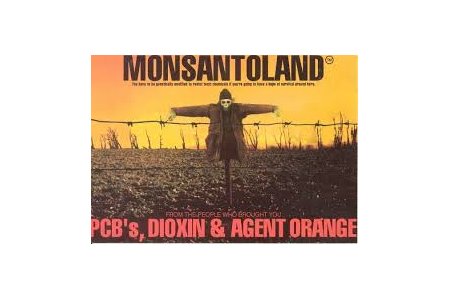 The World According to Monsanto
The World According to Monsanto
The World According to Monsanto is a 2008 documentary film directed by Marie-Monique Robin. Originally released in French as Le monde selon Monsanto, the film is based on Robin’s three-year long investigation into the US agricultural giant Monsanto corporation’s practices around the world.
Marie-Monique Robin (born in Poitou-Charentes in 1960) is an award-winning French journalist. She received the Albert Londres Prize in 1995 for Voleurs d’yeux, an expose about organ theft. She also wrote a book and made a film documentary titled Escadrons de la mort, l’école française (The Death Squads: The French School) which investigated ties between the French secret services and Argentine and Chilean counterparts. In this documentary she showed that counter-insurgency tactics used during the Algerian War (1954—62), including extensive use of torture, had been taught to Argentine security forces. The security forces later used them during the Dirty War in the 1970-80s and for Operation Condor. She received an award for "best political documentary of the year" by the French Senate in recognition of this investigation. In March 2008, her documentary "The World According to Monsanto" was aired on the Arte network in France and Germany and she won for this film many prizes like the Rachel Carson price in Norway and the Umwelt-Medienpreis in Germany.
After studying journalism in Strasbourg, she went to Nicaragua and worked in South America as a freelance reporter. She traveled to South America more than 80 times including 30 times to Cuba. She reported on the Colombian guerrillas and later worked for CAPA.
The documentary traces a wide range of controversies involving the use and promotion of genetically-modified seeds, polychlorinated biphenyls (PCBs), Agent Orange, and the bovine growth hormone. The film delves into cases across the United States (including Anniston, Alabama), Canada, India, Mexico, Paraguay, the United Kingdom and France, pointing out along the way how the corporation’s collusion with governments, pressure tactics, suppression and manipulation of scientific data, and extra-legal practices aided the company’s attempts at dominating global agriculture. The World According to Monsanto draws on first-hand interviews with scientists, representatives of the U.S. Food and Drug Administration and Environmental Protection Agency, civil society representatives, victims of the company’s activities, lawyers, and politicians.
Keywords
- Peasants’ rights
-
Peasants’ seeds
- UNDROP : Formation sur le droit aux semences
- 16 octobre : Journée internationale d’action pour la souveraineté alimentaire des peuples et contre les sociétés transnationales
- Semilla campesina Vs Semilla transgénica
- Seeds of Resistance
- 16 October: International Day of Action for Peoples’ Food Sovereignty and against Transnational corporations